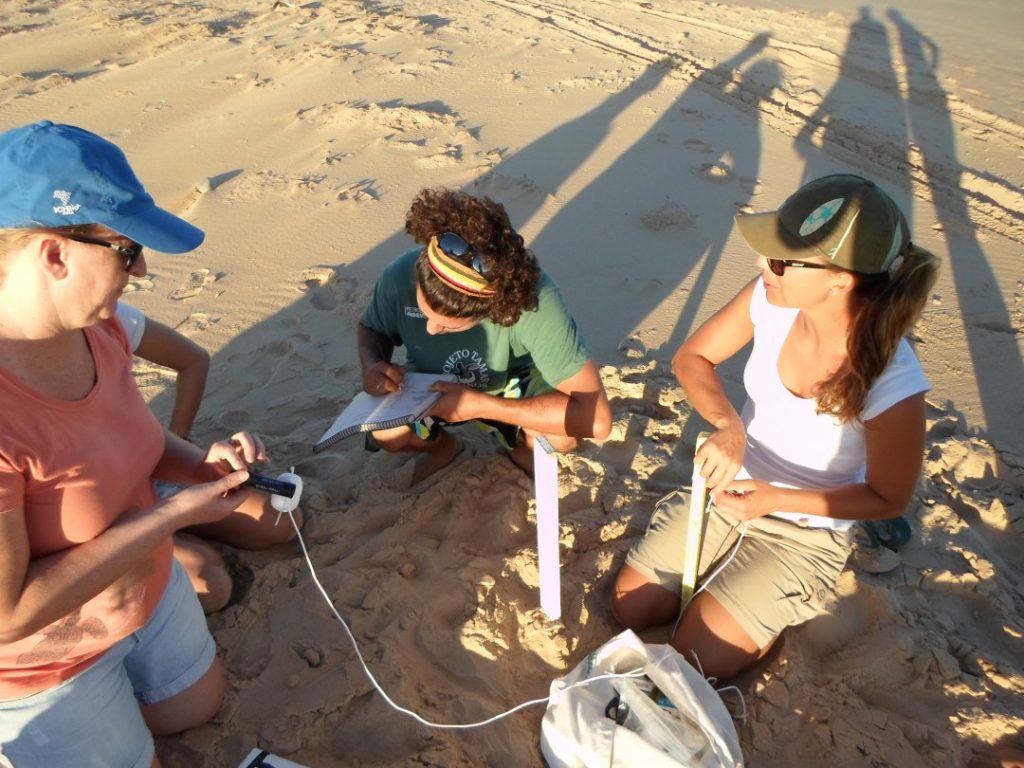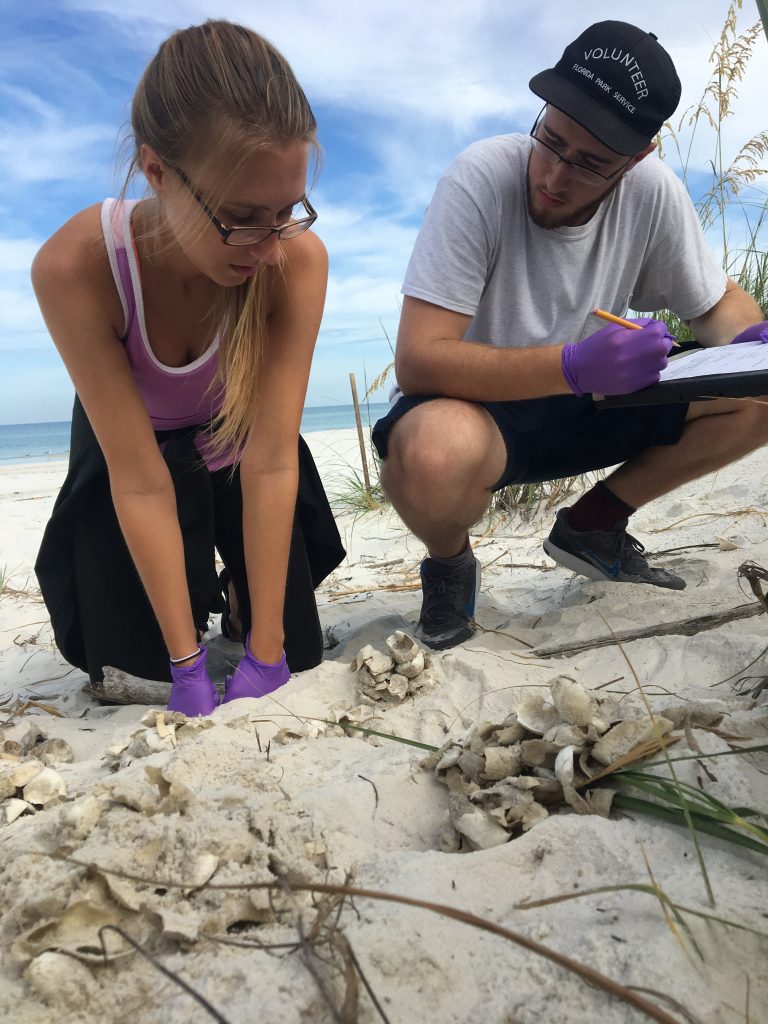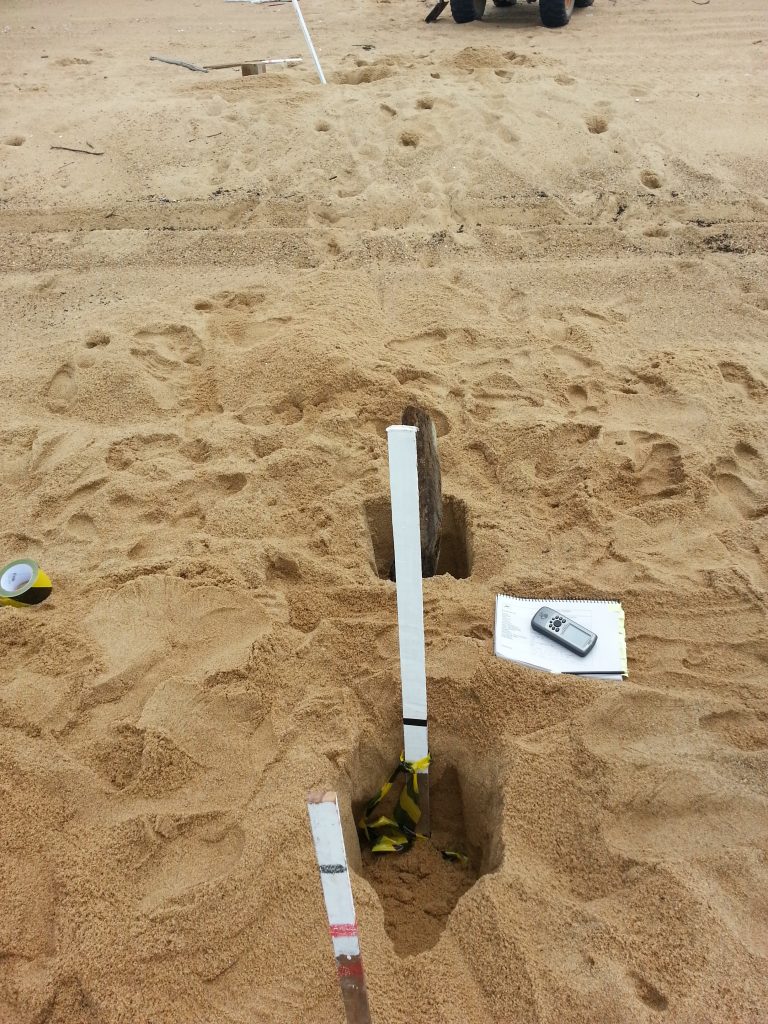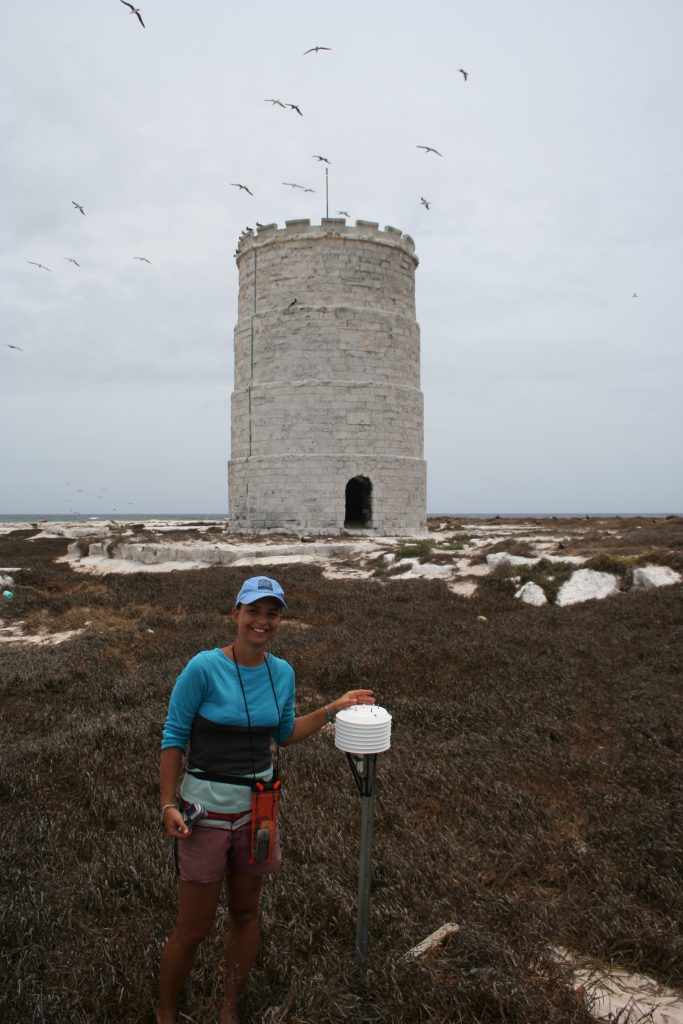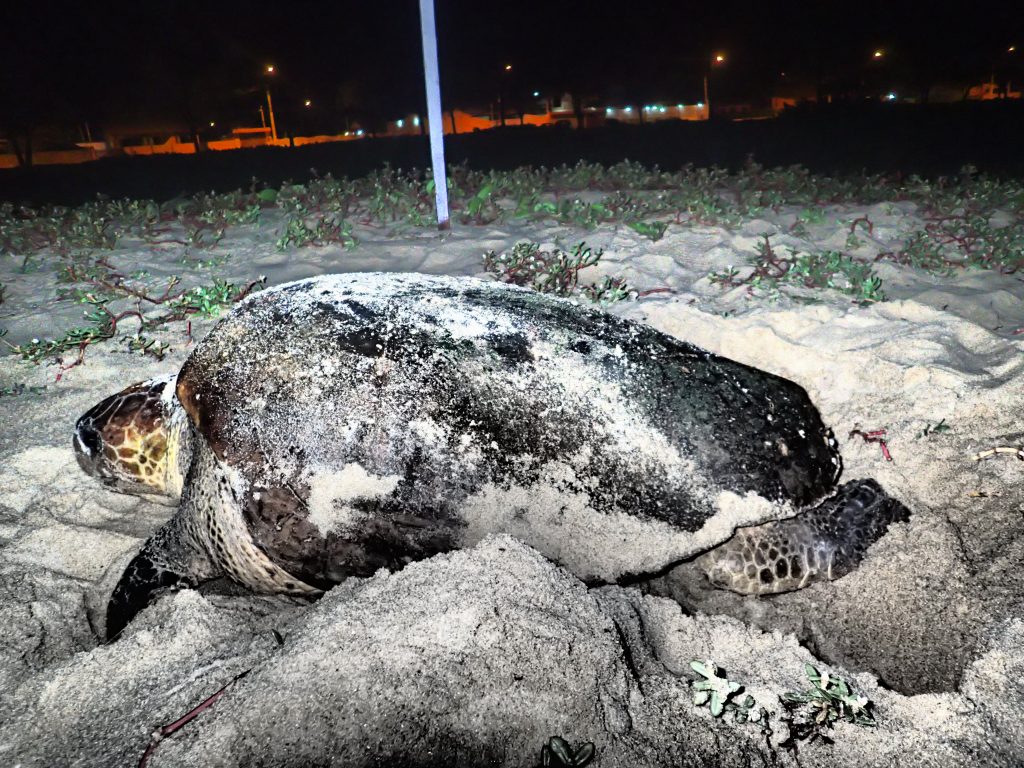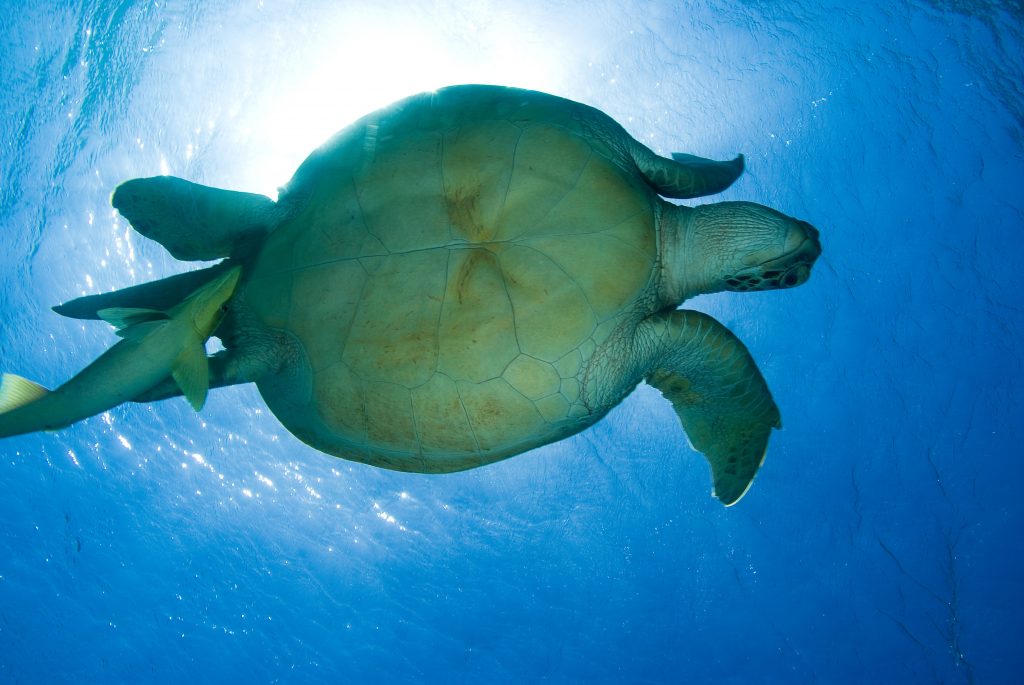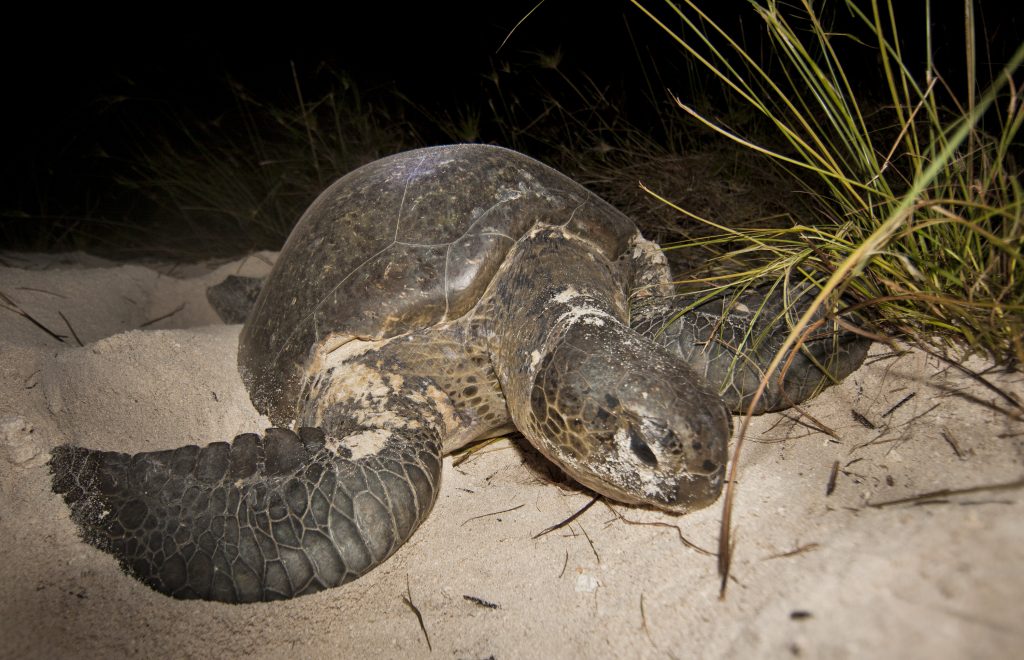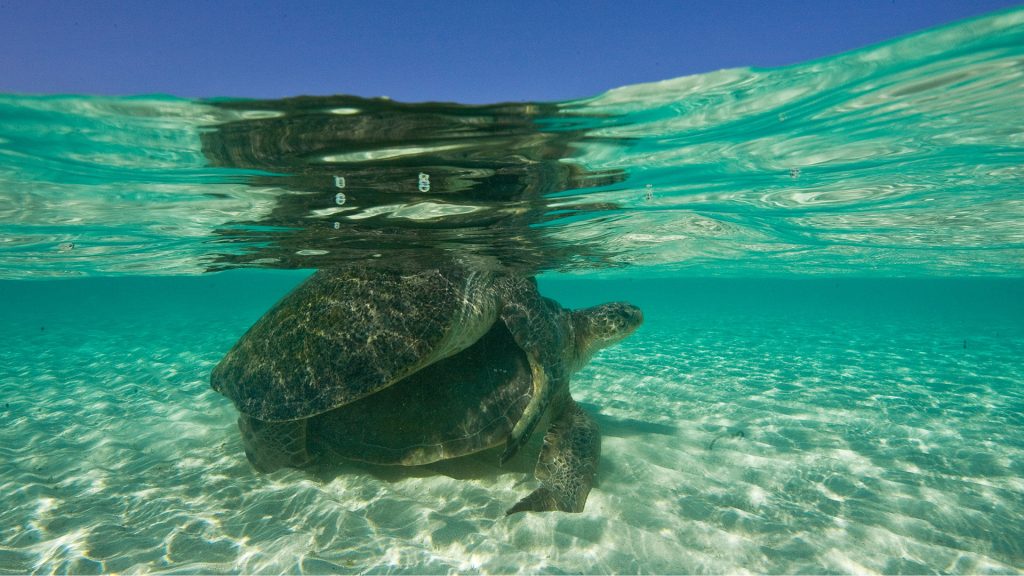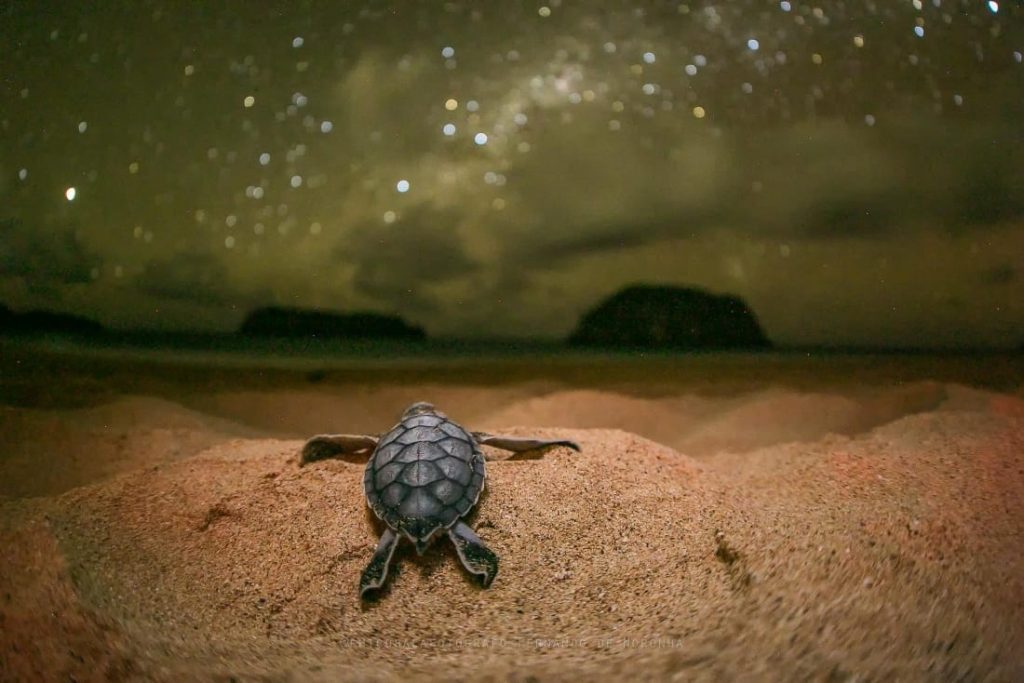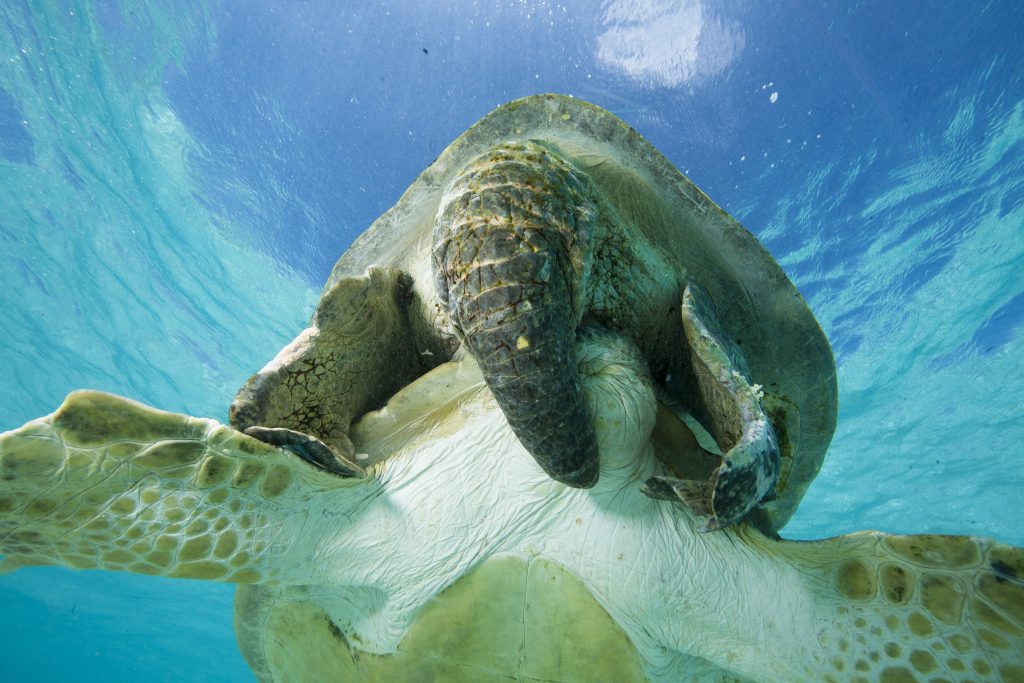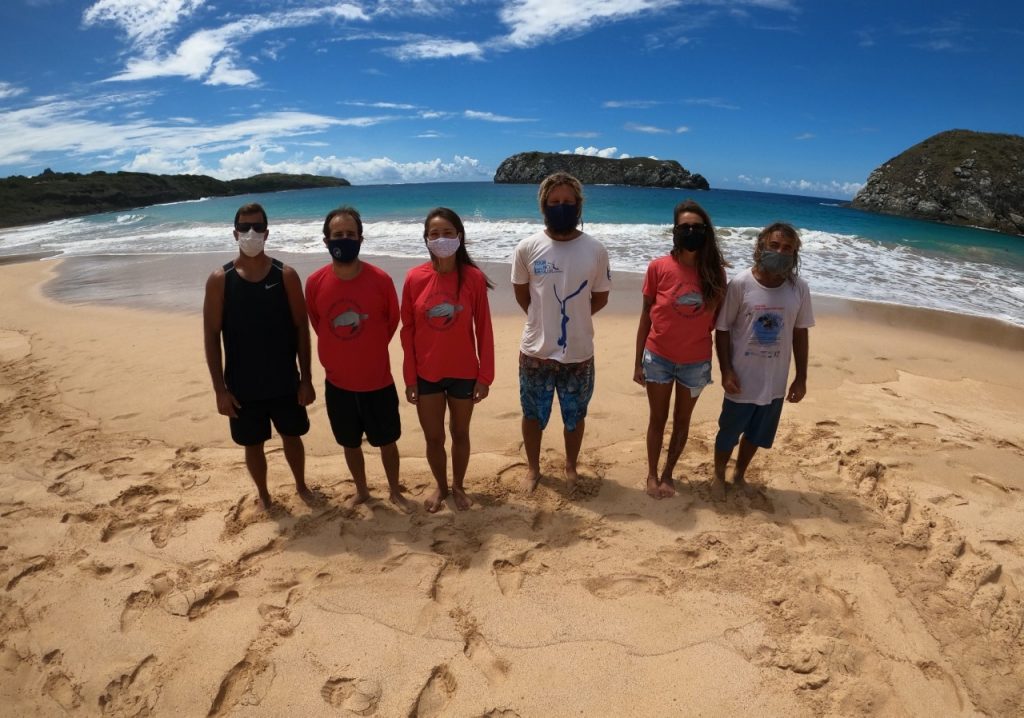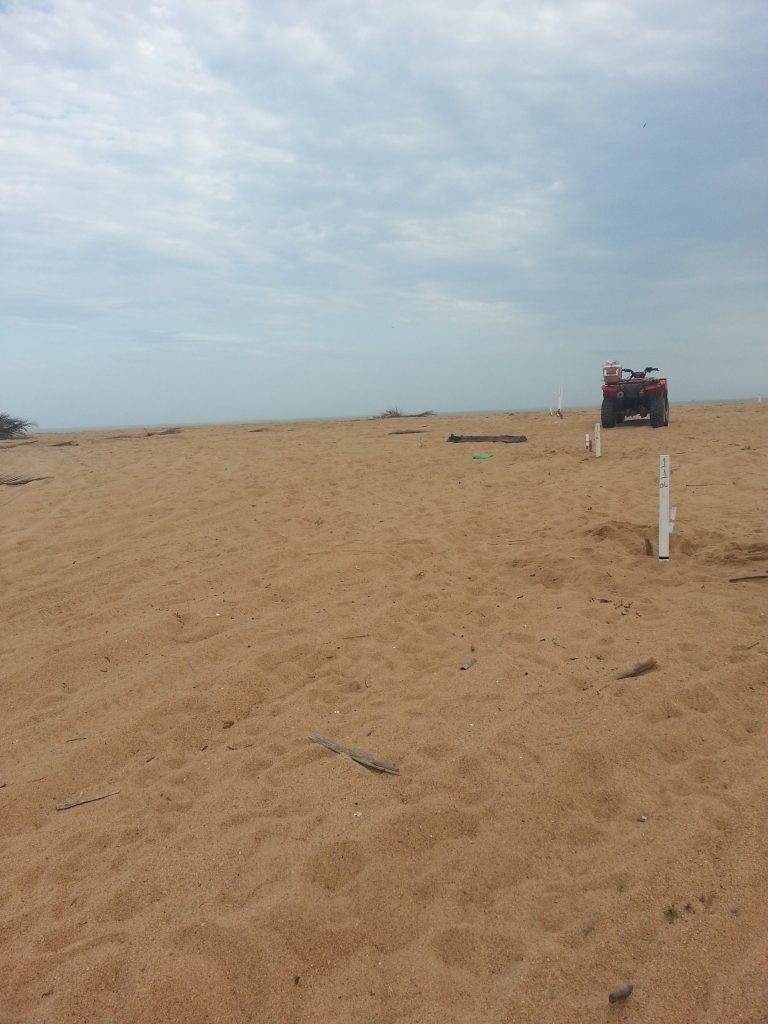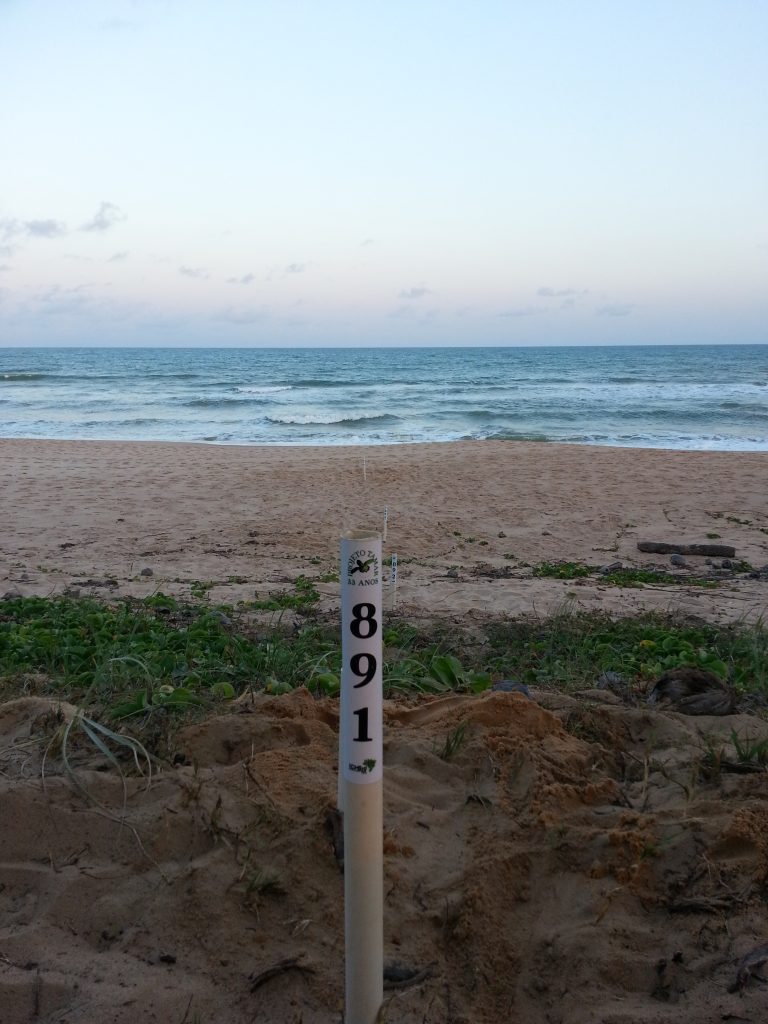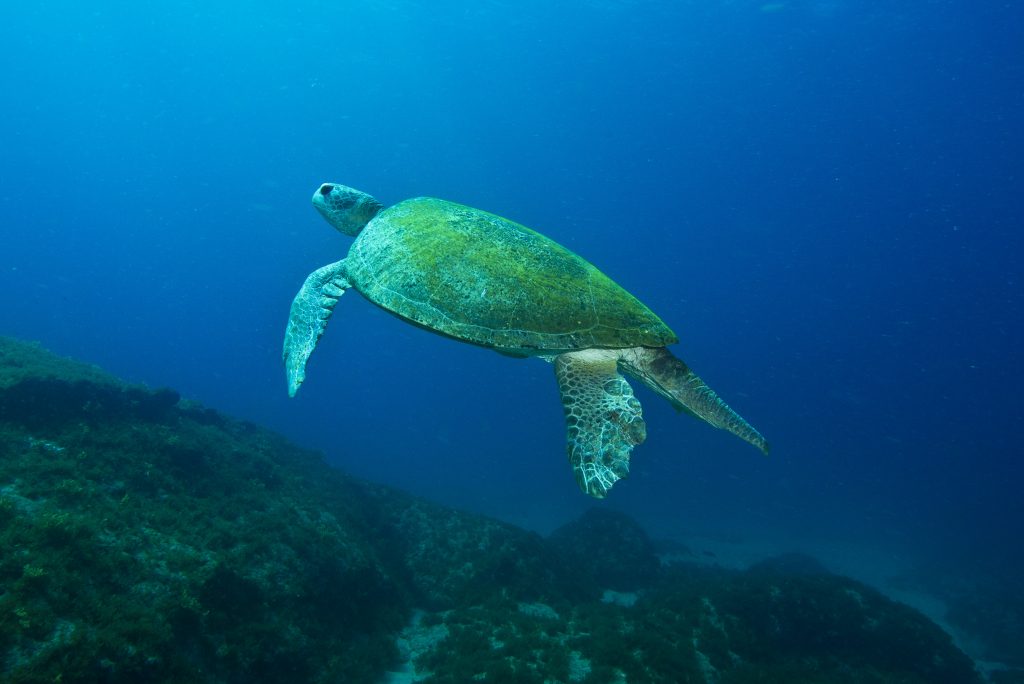All species of marine turtles will be directly and indirectly affected by climatic change that is manifested in both ocean and nesting beach changes. Climate change is expected to affect turtles in multiple ways and at all life stages, from the loss of nesting beaches resulting from sea level rise and increased erosion to feminization of turtle populations because of elevated nest temperatures, changes in reproductive periodicity, shifts in latitudinal ranges, and decreased reproductive success. Impacts from climate change will vary geographically, temporally, and between species and populations. Our lab uses novel approaches to better understand and predict impacts of climate change on marine turtles, with a particular interest on the capacity of marine turtles to adapt to climate change.
IMPACTS AND ADAPTIVE CAPACITY OF MARINE TURTLES TO CLIMATE CHANGE
SPECIFIC PROJECTS
- Mating systems as mechanisms for resilience of species with temperature-dependent sex determination under environmental change
- The effects of local climate on Caretta caretta hatchling output
- An integrated approach to assess the impacts of climate change on marine turtles in Brazil and inform their management
- What we know, what we don’t know, and what we need to know in relation to climate change and sea turtles in Florida
- Systematic priorities for the management of marine megafauna to increase their resilience to climate change
- Climate-mediated shifts in sea turtle nesting areas and future coastal development
- Vulnerability of the northern Great Barrier Reef green turtle population to climate change
PUBLICATIONS
Fuentes, M. M. P. B. , Santos, A. J. B., Abreu-Grobois, A., Briseño-Dueñas, R., Al-Khayat, J., Hamza, S., ... & Monsinjon, J. R. (2024). Adaptation of sea turtles to climate warming: Will phenological responses be sufficient to counteract changes in reproductive output? Global Change Biology. 30, e16991.
Jensen, M. P., Eguchi, T., FitzSimmons, N. N.,McCarthy, M. A., Fuentes, M. M. P. B. , Hamann, M., Limpus, C. J., Bell, I. P., Read, M. A (2022). Integrating climate change and management scenarios in population models to guide the conservation of marine turtles. Bulletin of Marine Science 98 (2), 131-154
Patrício, A. R., Hawkes, L. A., Monsinjon, J. R., Godley, B. J., Fuentes, M. M. P. B. (2021). Climate change and marine turtles: recent advances and future directions. Endangered Species Research, 44, 363-395.
Fuentes, M. M. P. B. , Marcovaldi, M. A., & Lara, P. (2021). Studying the Thermal Profile of Nesting Grounds to Infer Potential Impacts From Climate Change on Sea Turtles. In B. Nahill (Ed.), Sea turtle research and conservation: Academic Press.
Fuentes, M. M. P. B. , Allstadt, A. J., Ceriani, S. A., Godfrey, M. H., Gredzens, C., Helmers, D., Ingram, D., Pate, M., Radeloff, V. C., Shaver, D.J., Wildermann, N., Taylor, L., Bateman, B. L. (2020). Potential adaptability of marine turtles to climate change may be hindered by coastal development in the USA. Regional Environmental Change, 20(3), 104.
Monsinjon, J. R., Wyneken, J., Rusenko, K., Lopez, M., Lara, P., Santos, A., Marcovaldi, M. A. G., Fuentes, M. M. P. B. , Kaska, Y., Tucek, J., Nel, R., Williams, K. L., LeBlanc, A., Rostal, D., Guillon, J., & Girondot, M. (2019). The climatic debt of loggerhead sea turtle populations in a warming world. Ecological Indicators, 107, 105657.
Monsinjon, J., Lopez, M., Lara, P., Santos, A., Marcovaldi, M. A. G., Girondot, M., Fuentes, M. M. P. B. (2019). The effects of temperature and demography on the nesting phenology of loggerhead turtles in Brazil. Marine Ecology Progress Series, 623, 209-219.
Montero, N., P. S. Tomillo, V. S. Saba, M. A. G. dei Marcovaldi, M. López-Mendilaharsu, A. S. Santos, Fuentes, M. M. P. B. (2019). Effects of local climate on loggerhead hatchling production in Brazil: Implications from climate change. Scientific Reports. 9:8861.
Montero, N., Marcovaldi M.A.G., López-Mendilaharsu M., Santos A.S., Fuentes, M. M. P. B. (2018). Warmer and wetter conditions will reduce offspring production of hawksbill turtles in Brazil under climate change. Plos One 13(11).
Montero, N., Ceriani, S.A., Graham, K., Fuentes, M. M. P. B. (2018). Influences of the local climate on loggerhead hatchling production in North Florida: Implications from climate change. Frontiers in Marine Science, 5, 262
Stys, B., Fuentes, M. M. P. B. , Glazer, B., Karish, K., Montero, N., & Reece, J. (2017). Climate Change Impacts on Florida's Biodiversity and Ecology. In Chassignet Ep, Jones JW, Misra V, & Beysekera J (Eds.), Florida's Climate: Changes, Variations, & Impacts. Florida Climate Institute, Gainsville Fl, USA.
Fuentes, M. M. P. B. , Monsinhon, J., Lopez, M., Lara, P., Santos, A., Marcovaldi, M. A. G., Girondot, M. (2017). Sex ratio estimates for species with temperature-dependent sex determination differ according to the proxy used. Ecological Modelling. 365, 55-67.
Fuentes, M. M. P. B. , Chambers LE, Chin A, Dann P, Dobbs K, Poloczanska E, Maison K, Turner M, Pressey RL, Marsh H (2016) Adaptive management of marine megafauna in a changing climate. Mitigation and Adaptation Strategies for Global Change, 21, 209- 224.
Marcovaldi MA, López-Mendilaharsu M, Santos AS, Gustave GL, Godfrey M, Tognin F, Baptistotte C, Thome JC, Dias ACC, Castilhos JC, & Fuentes, M. M. P. B. (2016) Identification of loggerhead male producing beaches in the south Atlantic: Implications for conservation. Journal of Experimental Marine Biology and Ecology, 477, 14-22.
Fuentes, M. M. P. B. , & Saba, V. (2016). Impacts and effects of ocean warming on marine turtles. In Laffoley, D., & Baxter, J. M (Eds.), Explaining ocean warming: Causes, scale, effects and consequences. Gland, Switzerland: IUCN.
Jourdan J, Fuentes, M. M. P. B. (2015) Effectiveness of strategies to mitigate the impacts of projected changes in temperature on sea turtle reproductive output. Mitigation and Adaptation Strategies for Global Change. 20, 121- 133.
Marcovaldi MAG, Santos AJB, Santos AS, Soares LS, Lopez GG, Godfrey MH, López-Mendilaharsu M, Fuentes, M. M. P. B. (2014) Spatio-temporal variation in the incubation duration and sex ratio of hawksbill hatchlings: implication for future management. Journal of Thermal Biology. 44, 70-77.
Fuentes, M. M. P. B. , Pike DA, Dimatteo A, Wallace BP (2013) Resilience of marine turtle regional management units to climate change. Global Change Biology. 19, 1399–1406.
Fuentes, M. M. P. B. , Hamann, M., Lukoschek, V. (2012) Marine Reptiles and Climate Change. In A Marine Climate Change Impacts and Adaptation Report Card for Australia 2012 (Eds. ES Poloczanska, AJ Hobday and AJ Richardson). ISBN 978-0-643-10927-8.
Fuentes, M. M. P. B. , Porter W (2013) Using a microclimate model to evaluate impacts of climate change on sea turtles. Ecological Modelling, 251: 150-157.
Fuentes, M. M. P. B. , Fish M, Maynard J (2012) Management strategies to mitigate the impacts of climate change on sea turtle’s terrestrial reproductive phase. Mitigation and Adaptation Strategies for Global Change. 17, 51-63.
Hamann, M., Fuentes, M. M. P. B. , Ban, N., Mocellin, V. (2013) Climate change and marine turtles. In: The biology of sea turtles (Eds. J Wyneken , KJ Lohmann, JA Musick). Vol 3. Taylor & Francis Group, Boca Ranton, pp. 353- 378., ISBN 978-1-43-987307.
Fuentes, M. M. P. B. , Hamann, M., Lukoschek, V. (2012) Marine Reptiles and Climate Change. In A Marine Climate Change Impacts and Adaptation Report Card for Australia 2012 (Eds. ES Poloczanska, AJ Hobday and AJ Richardson). ISBN 978-0-643-10927-8.
Fuentes, M. M. P. B. , Limpus CJ, Hamann M (2011) Vulnerability of sea turtle nesting grounds to climate change. Global Change Biology. 17, 140-153.
Fuentes, M. M. P. B. , Hamann M and Limpus CJ (2010) Past, current and future thermal profiles for green turtle nesting grounds: implications from climate change. Journal of Experimental Marine Biology and Ecology, 383, 56-64.
Fuentes, M. M. P. B. , Dawson J, Smithers S, Limpus CJ, Hamann M (2010) Sedimentological characteristics of key sea turtle rookeries: potential implications under projected climate change. Journal of Marine and Freshwater Research, 6, 464- 473.
COLLABORATORS
Lisa Komoroske, University of Massachusetts
Will White, Oregon State University
Fundacao Pro Tamar
Jonathan Monsinjon
Will White, Oregon State University
Fundacao Pro Tamar
Jonathan Monsinjon
FUNDING
National Geographic, Ciencias sem Fronteiras, Padi Foundation, Australian Research Council, the Great Barrier Reef Marine Park Authority, Torres Strait Regional Authority, University of Florida. Sea Turtle License Plate. National Science Foundation
